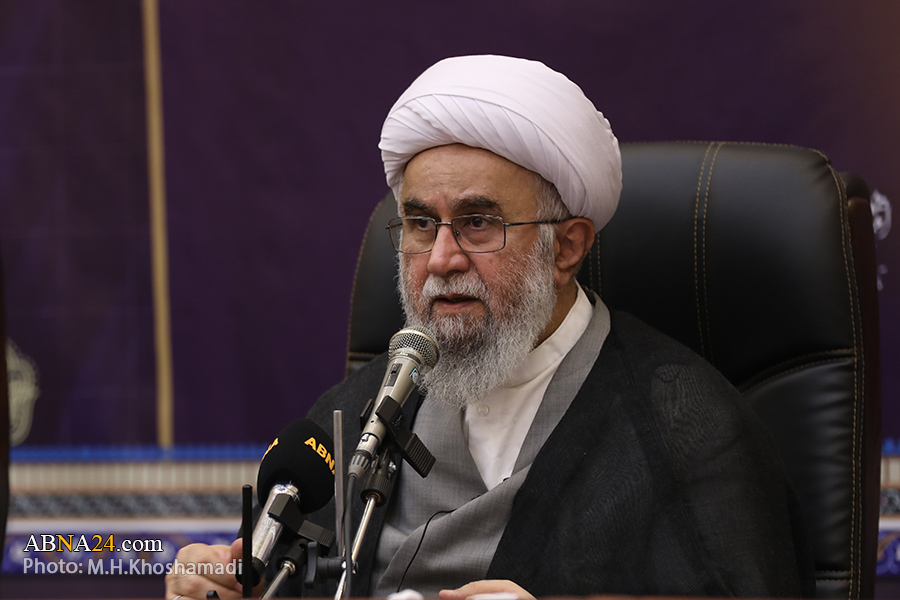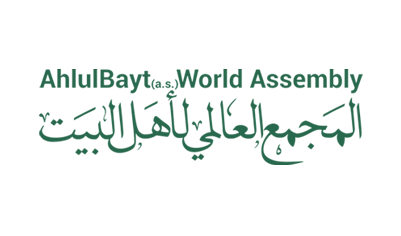The necessity of Sharh-e Sadr workplace; Ayatollah Ramazani explained
On Thursday, August 8, 2024, the administrative ethics session was held with the speech of Ayatollah Reza Ramazani, Secretary General of the AhlulBayt (a.s.) World Assembly, and with the presence of the assembly’s managers and staff.
ABWA Official Website – On Thursday, August 8, 2024, the administrative ethics session was held with the speech of Ayatollah Reza Ramazani, Secretary General of the AhlulBayt (a.s.) World Assembly, and with the presence of the assembly’s managers and staff.

Expressing his condolences on the occasion of the mourning days of the month of Safar, he said, “Sharh-e Sadr (the openness of the chest [soul] with light) is one of the necessary characteristics of an organization, and all members of the organization, from the staff to the vice president and the managers, should all benefit from Shrh-e Sadr. Regarding the importance and position of Sharh-e Sadr, we read in Surah Taha: “قَالَ رَبِّ اشْرَحْ لِي صَدْرِي، وَيَسِّرْ لِي أَمْرِي، وَاحْلُلْ عُقْدَةً مِنْ لِسَانِي يَفْقَهُوا قَوْلِي، وَاجْعَلْ لِي وَزِيرًا مِنْ أَهْلِي” ((Moses) said: "O my Lord! expand me my breast* "Ease my task for me* "And remove the impediment from my speech,* "So they may understand what I say* "And give me a Minister from my family,) (Quran, 20: 25-29). Muses’ request from God for Sharh-e Sadr was not for proof of his prophethood. He already had the characteristics that qualified him to be chosen by God to be a prophet. Rather, his request was for things like Sharh-e Sadr, to have a good command of things, complete and fluent expression, and the need for expert people to be in charge of things to perform tasks in the prophetic mission.”
“Contrary to the statements of theologians, philosophers, and mystics who had a specific audience, the words of the prophets were universal and comprehensive. Imam Khomeini, who spoke simply and had a general audience, spoke based on Quranic verses and hadiths. The Supreme Leader’s words also have such characteristics. A manager or leader should speak in a way that is clear for everyone and concise. The words of a manager or leader should be solid and firm, and at the same time, away of complications,” Ayatollah Ramazani continued.
Pointing out verse 13 of Surah Taha regarding the choice of Moses (a.s.) as a prophet, the Secretary General of the AhlulBayt (a.s.) World Assembly stated, “One of his miracles was his rod that turned into a dragon and swallowed all the sorcery of the sorcerers and made them believe in God. His other miracle was the Bright Hand. When he entered the arena and received God’s command to move toward Pharaoh, he asked God for the mentioned 4 abilities. God also assured him and his brother Aaron that He would be with them step by step to fulfill their duty.”
Referring to verses 25 to 29 of Surah Taha, Ayatollah Ramazani said, “When a person enters an organization as a manager, he must inherently possess certain characteristics and continue to manage the organization using Sharh-e Sadr. The phrase “وَيَسِّرْ لِي أَمْرِي” (Ease my task for me) has different meanings for different people in different positions. Everyone must have good command to complete his or her task. Therefore, the on-job training and education in organizations is designed so that the members of each organization are updated in terms of knowledge and information and know their duties well.”
The Secretary General of the AhlulBayt (a.s.) World Assembly considered Sharh-e Sadr as unquestionable as light and introduced the prophets as enlightened by the light of Sharh-e Sadr.
Regarding the signs of Sharh-e Sadr, Ayatollah Ramazani stated, “The first sign of Sharh-e Sadr is meekness and tolerance. In this regard, we read in Dua Abu Hamzah Thumali that God is knowledgeable and meek. We have a heavy burden of responsibility, so we must be patient and meek. Some people are aware of the faults of other members of an organization and tell others, the thing that is forbidden in jurisprudence. Some others, knowing part of the truth, judge others, both of which are signs of the absence of Sharh-e Sadr.”
“Another sign of Sharh-e Sadr is resistance,” he added, “The various problems of an organization must be resisted, and if not, no progress will be made. Tolerating opposing views is another sign of Sharh-e Sadr. People who lack Sharh-e Sadr do not see others and consider only themselves. In other words, they consider their insignificant works as significant, and the significant works of others as insignificant. If a person is aware of his faults, he does not seek to find the faults of others. Therefore, we must first criticize ourselves, then others.”
Referring to a hadith of Imam Reza (a.s.), the Secretary General of the AhlulBayt (a.s.) World Assembly said, “In a hadith, Imam Reza (a.s.) said, “The intellect of a Muslim person is not complete unless he has 10 characteristics: people should expect good from him; people should be safe from his bad deeds; he should consider insignificant good of others as significant; he should count his own good as little; no matter how much people need from him, he doesn’t get sad; he should not get tired of seeking knowledge in his entire life; he considers poverty in the way of God more beloved than wealth (combined with corruption); he considers humiliation in the way of God more beloved than honor with God’s enemy; he considers anonymity more beloved than fame.” Then, Imam said, “The tenth characteristic is that he doesn’t look at anyone unless he considers them better and more pious than himself”.”
The arena of activity is the arena of education
Advising to pondering on Surah al-Kahf, Ayatollah Ramazani considered the story of Prophet Muses (a.s.) and Prophet Khizr (a.s.) as a clear example of divine and correct education.
He emphasized education in the arena of action. “Martyr Murtaza Motahari used to say that the arena of work is the arena of education. The arena of work is for growth and excellence, and one must broaden one’s outlook and mind. Individual, social, and divine ethics must be combined, so that the result, that is, individual, social, and divine etiquette, is achieved.”
Regarding management principles, the Secretary General of the AhlulBayt (a.s.) World Assembly said, “After reading more than 60 books about management, each of which had its style, I concluded that there are 4 principles in the field of management. The first is the scientific principle, which includes expertise and knowledge in the specific field; the second is the principle of jurisprudence which includes the dos and don’ts of work; the third is the moral principle, and the fourth is the principle of Wilayat. All management issues can be summarized in these 4 principles.”
At the end of the administrative ethics session, Ayatollah Ramazani emphasized the observance of ethical principles in the organization. He introduced issues such as good conduct, good words, trustworthiness, accepting responsibility, work discipline, follow-up, kindness, and tolerance among the ethical principles in society and the workplace.
**************
End/ 345
On Thursday, August 8, 2024, the administrative ethics session was held with the speech of Ayatollah Reza Ramazani, Secretary General of the AhlulBayt (a.s.) World Assembly, and with the presence of the assembly’s managers and staff.
ABWA Official Website – On Thursday, August 8, 2024, the administrative ethics session was held with the speech of Ayatollah Reza Ramazani, Secretary General of the AhlulBayt (a.s.) World Assembly, and with the presence of the assembly’s managers and staff.

Expressing his condolences on the occasion of the mourning days of the month of Safar, he said, “Sharh-e Sadr (the openness of the chest [soul] with light) is one of the necessary characteristics of an organization, and all members of the organization, from the staff to the vice president and the managers, should all benefit from Shrh-e Sadr. Regarding the importance and position of Sharh-e Sadr, we read in Surah Taha: “قَالَ رَبِّ اشْرَحْ لِي صَدْرِي، وَيَسِّرْ لِي أَمْرِي، وَاحْلُلْ عُقْدَةً مِنْ لِسَانِي يَفْقَهُوا قَوْلِي، وَاجْعَلْ لِي وَزِيرًا مِنْ أَهْلِي” ((Moses) said: "O my Lord! expand me my breast* "Ease my task for me* "And remove the impediment from my speech,* "So they may understand what I say* "And give me a Minister from my family,) (Quran, 20: 25-29). Muses’ request from God for Sharh-e Sadr was not for proof of his prophethood. He already had the characteristics that qualified him to be chosen by God to be a prophet. Rather, his request was for things like Sharh-e Sadr, to have a good command of things, complete and fluent expression, and the need for expert people to be in charge of things to perform tasks in the prophetic mission.”
“Contrary to the statements of theologians, philosophers, and mystics who had a specific audience, the words of the prophets were universal and comprehensive. Imam Khomeini, who spoke simply and had a general audience, spoke based on Quranic verses and hadiths. The Supreme Leader’s words also have such characteristics. A manager or leader should speak in a way that is clear for everyone and concise. The words of a manager or leader should be solid and firm, and at the same time, away of complications,” Ayatollah Ramazani continued.
Pointing out verse 13 of Surah Taha regarding the choice of Moses (a.s.) as a prophet, the Secretary General of the AhlulBayt (a.s.) World Assembly stated, “One of his miracles was his rod that turned into a dragon and swallowed all the sorcery of the sorcerers and made them believe in God. His other miracle was the Bright Hand. When he entered the arena and received God’s command to move toward Pharaoh, he asked God for the mentioned 4 abilities. God also assured him and his brother Aaron that He would be with them step by step to fulfill their duty.”
Referring to verses 25 to 29 of Surah Taha, Ayatollah Ramazani said, “When a person enters an organization as a manager, he must inherently possess certain characteristics and continue to manage the organization using Sharh-e Sadr. The phrase “وَيَسِّرْ لِي أَمْرِي” (Ease my task for me) has different meanings for different people in different positions. Everyone must have good command to complete his or her task. Therefore, the on-job training and education in organizations is designed so that the members of each organization are updated in terms of knowledge and information and know their duties well.”
The Secretary General of the AhlulBayt (a.s.) World Assembly considered Sharh-e Sadr as unquestionable as light and introduced the prophets as enlightened by the light of Sharh-e Sadr.
Regarding the signs of Sharh-e Sadr, Ayatollah Ramazani stated, “The first sign of Sharh-e Sadr is meekness and tolerance. In this regard, we read in Dua Abu Hamzah Thumali that God is knowledgeable and meek. We have a heavy burden of responsibility, so we must be patient and meek. Some people are aware of the faults of other members of an organization and tell others, the thing that is forbidden in jurisprudence. Some others, knowing part of the truth, judge others, both of which are signs of the absence of Sharh-e Sadr.”
“Another sign of Sharh-e Sadr is resistance,” he added, “The various problems of an organization must be resisted, and if not, no progress will be made. Tolerating opposing views is another sign of Sharh-e Sadr. People who lack Sharh-e Sadr do not see others and consider only themselves. In other words, they consider their insignificant works as significant, and the significant works of others as insignificant. If a person is aware of his faults, he does not seek to find the faults of others. Therefore, we must first criticize ourselves, then others.”
Referring to a hadith of Imam Reza (a.s.), the Secretary General of the AhlulBayt (a.s.) World Assembly said, “In a hadith, Imam Reza (a.s.) said, “The intellect of a Muslim person is not complete unless he has 10 characteristics: people should expect good from him; people should be safe from his bad deeds; he should consider insignificant good of others as significant; he should count his own good as little; no matter how much people need from him, he doesn’t get sad; he should not get tired of seeking knowledge in his entire life; he considers poverty in the way of God more beloved than wealth (combined with corruption); he considers humiliation in the way of God more beloved than honor with God’s enemy; he considers anonymity more beloved than fame.” Then, Imam said, “The tenth characteristic is that he doesn’t look at anyone unless he considers them better and more pious than himself”.”
The arena of activity is the arena of education
Advising to pondering on Surah al-Kahf, Ayatollah Ramazani considered the story of Prophet Muses (a.s.) and Prophet Khizr (a.s.) as a clear example of divine and correct education.
He emphasized education in the arena of action. “Martyr Murtaza Motahari used to say that the arena of work is the arena of education. The arena of work is for growth and excellence, and one must broaden one’s outlook and mind. Individual, social, and divine ethics must be combined, so that the result, that is, individual, social, and divine etiquette, is achieved.”
Regarding management principles, the Secretary General of the AhlulBayt (a.s.) World Assembly said, “After reading more than 60 books about management, each of which had its style, I concluded that there are 4 principles in the field of management. The first is the scientific principle, which includes expertise and knowledge in the specific field; the second is the principle of jurisprudence which includes the dos and don’ts of work; the third is the moral principle, and the fourth is the principle of Wilayat. All management issues can be summarized in these 4 principles.”
At the end of the administrative ethics session, Ayatollah Ramazani emphasized the observance of ethical principles in the organization. He introduced issues such as good conduct, good words, trustworthiness, accepting responsibility, work discipline, follow-up, kindness, and tolerance among the ethical principles in society and the workplace.
**************
End/ 345

